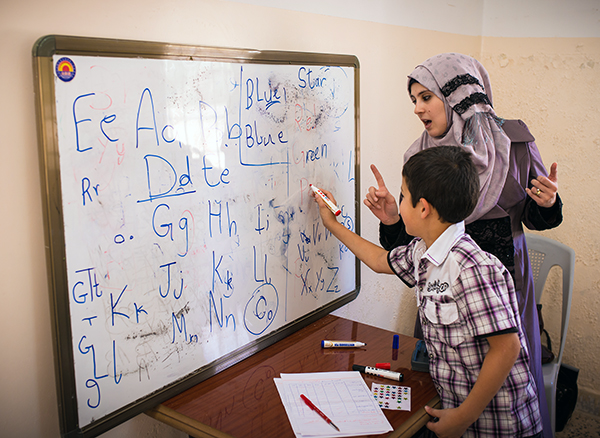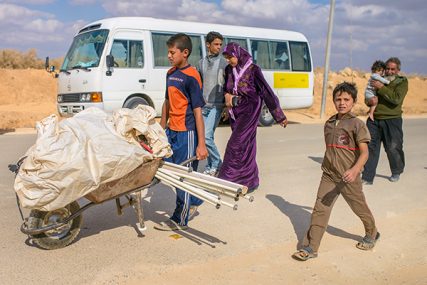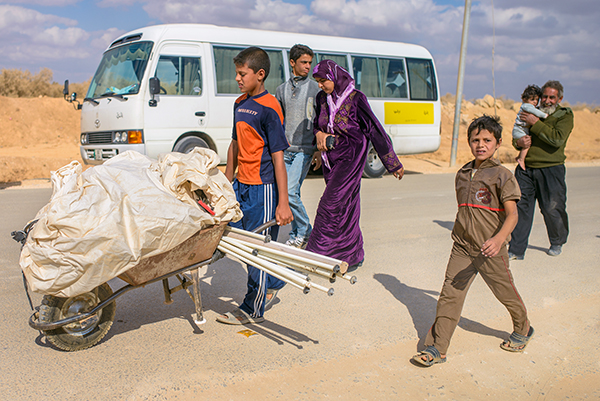
Syrian children participate in a World Vision remedial education program in Jordan. They are tutored in subjects like math, Arabic and English to help them catch up on the school they’ve missed fleeing the violence.
(RNS ) Dominating the news on World Refugee Day, the annual commemoration of displaced peoples, observed this Friday (June 20), are photos and videos of people fleeing Syria and Iraq.
With so many countries in turmoil it’s easy to understand how the U.N. refugee agency counts more than 45 million refugees and displaced persons in the world. What’s not always clear is where they will go and who will help them.
On the front line of aid for many of these people are religious groups who help refugees not only out of sympathy for their plight, but also because of commandments in sacred texts.
“For Christians, at least, we reach out to refugees and other immigrants because the Bible instructs us to do so,” said Matthew Soerens, a World Relief staffer and field director of the Evangelical Immigration Table.
World Relief is one of nine State Department recognized voluntary resettlement agencies that work through Health and Human Services to resettle refugees in the U.S. Six are faith-based, including Church World Service, Episcopal Migration Ministries, HIAS (the former Hebrew Immigrant Aid Society), Lutheran Immigration and Refugee Service, and the U.S. Conference of Catholic Bishops.
From both Old and New Testament texts, Christians find ample evidence that they are to “love the stranger” (Deuteronomy) and “welcome the stranger” (Matthew) as commandments. “In Matthew 25, Jesus says that by welcoming a stranger we are actually welcoming him,” said Soerens.
Jewish law commands that refugees be welcomed and protected as part of “tikkun olam,” or repairing the world, a core tenet of Judaism. Old Testament references include Leviticus 19:33-34: “When a stranger resides with you in your land, you shall not wrong him. The stranger who resides with you shall be to you as one of your citizens; you shall love him as yourself, for you were strangers in the land of Egypt.”
For HIAS, the Jewish resettlement agency, the cause of refugees runs deep. The 1951 U.N. Refugee Convention resulted, in part, because many Jewish refugees in World War II were not granted refuge or were turned back to their country of origin to face certain death.
Today, HIAS works with UNHCR, the U.N. refugee agency, to resettle refugees in the U.S. as well as other countries.
“Guided by our Jewish values and history, we help refugees rebuild their lives in safety and advocate to ensure that all displaced people are treated with dignity, regardless of ethnicity, religion, or place of birth,” according to its website.

Syrian refugees in Za’atari camp in Jordan. The camp currently houses more than 80,000 refugees who have been forced to flee their homes due to the Syria conflict.
Islam requires followers to offer not only hospitality to the stranger but asylum to anyone who feels threatened or is fleeing. The Quran states, “He who emigrates in the path of God will find frequent refuge and abundance.”
According to Islamic Relief Worldwide, “The concept of ‘aman,’ which is intrinsic in Shariah, encompasses the rights of refugees and asylum seekers and the duties incumbent upon the hosts.”
As part of the recognition of the role faith communities play in working with refugees, UNHCR convened a dialogue with faith-based groups that resulted in an affirmation for faith leaders, published last year. Distributed in eight languages, “Welcoming the Stranger: Affirmations for Faith Leaders,” includes tenets of all the major world religions in a document that affirms, in part, “My faith teaches that compassion, mercy, love and hospitality are for everyone: the native born and the foreign born, the member of my community and the newcomer.”
While some may wage wars in the name of their religion, others care for the refugees who flee the violence because of their own faith.
(Dale Hanson Bourke is the author of “Immigration: Tough Questions, Direct Answers.” Follow her on Twitter or at DaleHansonBourke.com)
YS/AMB END BOURKE





